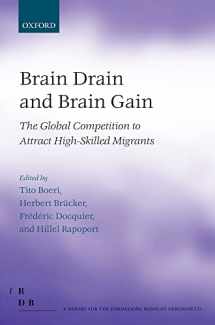
Brain Drain and Brain Gain: The Global Competition to Attract High-Skilled Migrants (Fondazione Rodolfo Debendetti Reports)
ISBN-13:
9780199654826
ISBN-10:
0199654824
Edition:
1
Author:
Tito Boeri, Herbert Brucker, Frederic Doquier, Hillel Rapoport
Publication date:
2012
Publisher:
Oxford University Press
Format:
Hardcover
336 pages
FREE US shipping
Book details
ISBN-13:
9780199654826
ISBN-10:
0199654824
Edition:
1
Author:
Tito Boeri, Herbert Brucker, Frederic Doquier, Hillel Rapoport
Publication date:
2012
Publisher:
Oxford University Press
Format:
Hardcover
336 pages
Summary
Brain Drain and Brain Gain: The Global Competition to Attract High-Skilled Migrants (Fondazione Rodolfo Debendetti Reports) (ISBN-13: 9780199654826 and ISBN-10: 0199654824), written by authors
Tito Boeri, Herbert Brucker, Frederic Doquier, Hillel Rapoport, was published by Oxford University Press in 2012.
With an overall rating of 4.4 stars, it's a notable title among other
books. You can easily purchase or rent Brain Drain and Brain Gain: The Global Competition to Attract High-Skilled Migrants (Fondazione Rodolfo Debendetti Reports) (Hardcover) from BooksRun,
along with many other new and used
books
and textbooks.
And, if you're looking to sell your copy, our current buyback offer is $2.09.
Description
The worldwide race to attract talents is getting tougher. The US has been leading the race, with its ability to attract PhD candidates and graduates not only from emerging countries, but also from the European Union. However, a growing number of countries have adopted immigration policies specifically aimed at selecting and attracting skilled workers. This book describes the global competition to attract talents. It focuses in particular on two phenomena: the brain gain and brain drain associated with high-skilled migration. Part I provides an overview of immigration policies designed to draw in skilled workers. It describes the economic gains associated with skilled immigration in the destination countries and the main determinants of the inflows of skilled immigrants (such as wage premia on education and R&D spending). It also discusses why skill-selective immigration policies do not find more support in receiving countries and shows that interest groups are actively engaged in affecting policies towards skilled migrants. Part II examines the consequences of brain drain for the sending countries. It reviews the channels through which skilled emigration can affect the source countries and looks at remittances, return migration, diaspora externalities, and network effects that may compensate the sending countries for their loss of human capital. Contrary to traditional wisdom, the results indicate that most developing countries experience a net gain from skilled emigration.


We would LOVE it if you could help us and other readers by reviewing the book
Book review

Congratulations! We have received your book review.
{user}
{createdAt}
by {truncated_author}


